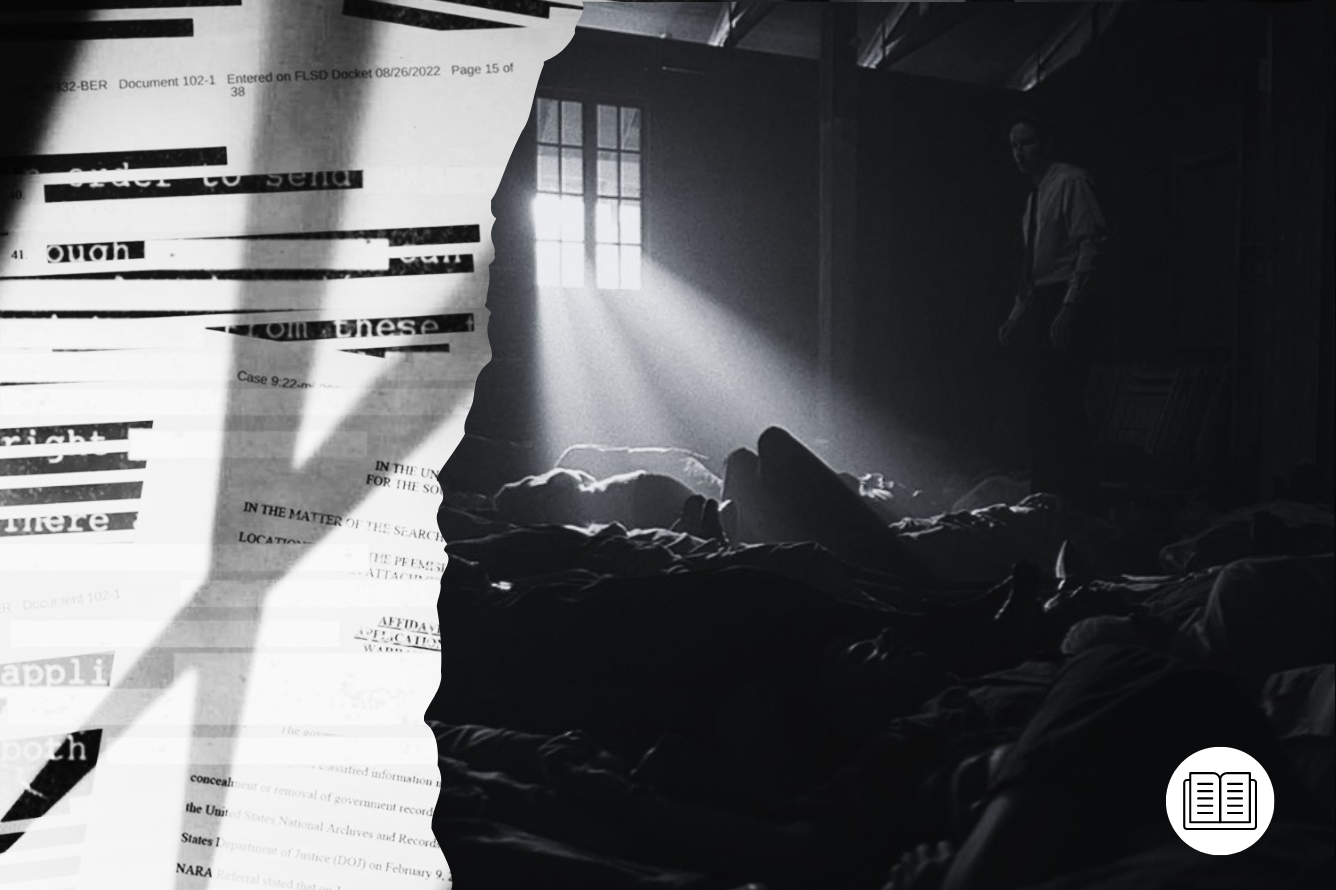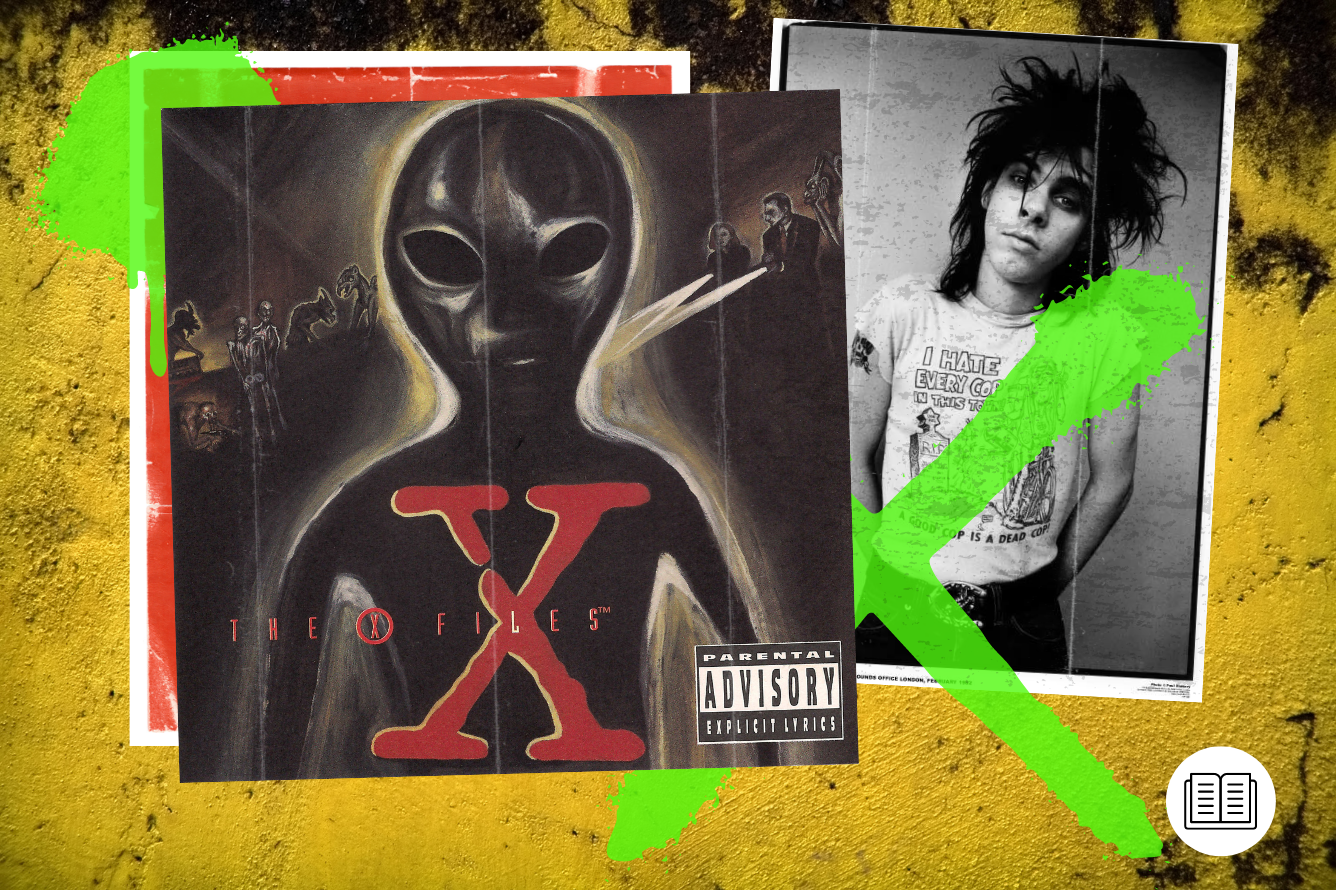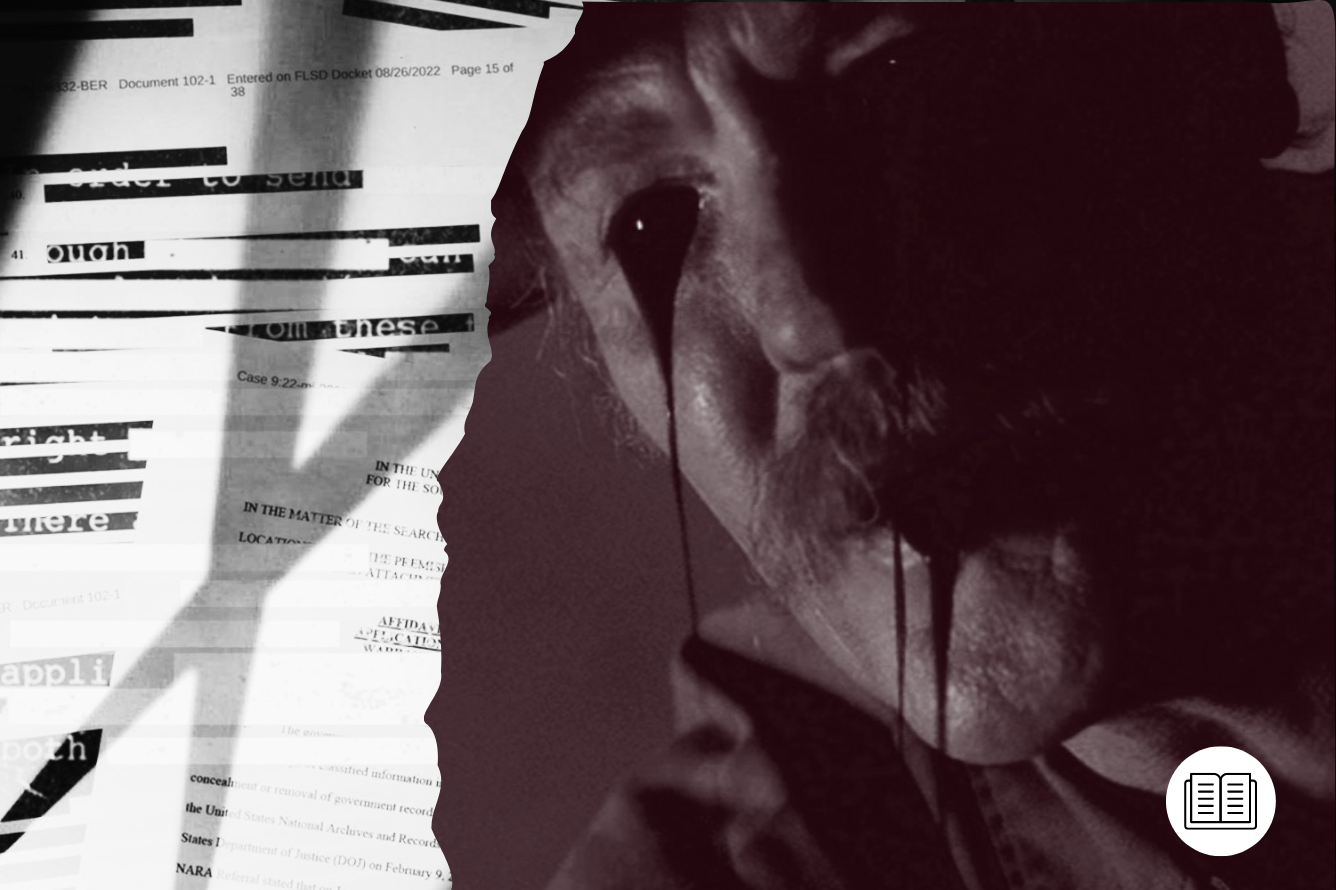Male figures of intense charisma are writ large across The X-Files, all the way from protagonist Fox Mulder downward. David Duchovny’s laconic, handsome, disarming ability to present even the strangest of conceits to an audience was, in large part, why Chris Carter’s series was such a success. Around him, within not just the ongoing series mythology but a litany of ‘standalone’ episodes, lay male characters built on a much darker, possessive oratory and narrative power.
The X-Files episode ‘The Field Where I Died’ (S4, Ep5) is built on one such man: Vernon Ephesian, played by Michael Massee, a talented character actor perhaps best known for a sinister turn as a primary villain on the hit action series 24. Ephesian is not the focus of Glen Morgan and James Wong’s script, but he serves as a catalyst for the central plot as Mulder and Scully form part of an FBI task force, in tandem with the Bureau of Alcohol, Tobacco & Firearms (ATF), to raid the Temple of the Seven Stars, a fundamentalist religious cult in Tennessee led by Ephesian, a man accused of child abuse and hoarding illicit firearms.
Assistant Director Skinner (Mitch Pileggi), the agents’ erstwhile superior, points out why Mulder and Scully would be on such a case. “You were assigned to this operation to investigate claims of Ephesian's paranormal abilities... channeling, astral projection.” Immediately, Ephesian is presented as a powerful, singular male force with apparent dominion over what the human mind is capable of. Aside from being a natural draw to Mulder – ever interested in proving supernatural phenomenon – Ephesian encapsulates a prosaic, underlying fear in The X-Files: that the extraordinary and dangerous lurk in the ostensible normality of America.

“You have to believe that he believes his own rap. When he speaks, he's just explaining that 'this is the way it is' – and that's when it gets very scary,” Massee explains in Andy Meisler’s I Want to Believe: The Official Guide to the X-Files Volume 3 (1998). Scully describes him as a “paranoid charismatic sociopath.” Ephesian’s power comes not in the rumors of the paranormal feats he can achieve—which Morgan and Wong have no interest in turning into reality—but rather the charismatic power of his zealotry. When we first meet him, he’s preparing to lead a cluster of followers—including his wife Melissa (Kristen Cloke)—to take their own lives by drinking poison.
Skinner very early on, aware the FBI/ATF operation has failed to conclusively provide enough evidence to shut down the Temple, voices the anxiety of law enforcement as to Ephesian’s potential power: “My concern is if the Temple members are released, any subsequent federal investigation will ignite Ephesian's paranoia to such a degree that we won't have another Waco on our hands... we'll have Jonestown.” These are two key real-life cultural and political touchstones that inform the underlying plot of ‘The Field Where I Died’ but also how The X-Files portrays dangerous, near messianic cult leaders such as Ephesian across the series’ run.
Jim Jones, The Jonestown Massacre, and ‘The Field Where I Died’
Jonestown was the first. The informal name of the People’s Temple Agricultural Project, a remote settlement in the South American republic of Guyana, Jonestown was so named after such a hypnotic male figure: Jim Jones.
He formed the People’s Temple, a US cult, over 900 of whose members all died in 1978 from cyanide poisoning in what was long deemed a ‘mass suicide’ but has been revised, over time, into more of a ‘murder suicide’ given not all the deaths were consensual on the part of the cultists. It remains the largest cult-influenced massacre in history.

Jones’ sect, much like the Temple of the Seven Stars, had its roots in Post-War Christian fundamentalism — Jones having formed the People’s Temple in Indiana in 1955 out of the evangelical Pentecostal movement —but Jones practiced what he called “apostolic socialism”; he had studied the work of Mao Zedong, Adolf Hitler, and Joseph Stalin as a child, and considered the latter as well as Vladimir Lenin personal heroes. Jonestown massacre survivor Deborah Layton suggests in her book Seductive Poison (1998) that Jones believed: “Those who remained drugged with the opiate of religion had to be brought to enlightenment—socialism.”
There are similarities and differences with Ephesian here. Ephesian certainly intends for his Seven Stars members to die in a similar fashion, thanks to cyanide-laced fruit juice, but whereas Jones had a zealous skepticism of scripture, Ephesian is obsessed with the Book of Revelation. He believes the attack by the FBI/ATF is pre-ordained:
“I knew you were coming. I've known for nine centuries. It was written in the Revelation of Jesus Christ... "Behold... the devil shall cast some of thee into prison that you may be tried... you'll have tribulation for ten days. Be thou faithful unto death and I'll give thee a crown of life.”
He believes he was present to hear the apostles deliver a message of apocalypse.
David Koresh, The Waco Siege, and ‘The Field Where I Died’
Waco is the second event Skinner refers to and – as ‘The Field Where I Died’ was released in 1996 – it was by far the most recent, relevant, and resonant to audiences, not to mention far closer to home. Thirteen miles north of Waco, Texas lay Mount Carmel Center, home of the Branch Davidians, a religious sect run by a man named David Koresh. In the late winter/spring of 1993, the ATF laid siege to the compound for 51 days in an attempt to uncover illegal weapons stockpiles.

Six Branch Davidians and four law enforcement officers died in the violent, heavily televised siege, or ‘massacre’, as it became known before the FBI launched a tear gas assault on Mount Carmel that ultimately led to the compound going up in flames. In total, 76 Branch Davidians died – including 25 children, two pregnant women, and Koresh himself. The legacy of Waco as a political incendiary operation remains to this day and many observers believe it was, during the early 1990s, a formative inspiration for not just Timothy McVeigh’s Oklahoma City bombing (which would influence the opening of the first X-Files movie), but also the ongoing rise and proliferation of right-wing American militia movements.
Koresh is nevertheless the more direct inspiration for Ephesian. The Branch Davidians – born the same year as Jones’ temple in 1955 – were founded on a belief in the Second Coming of Christ and an imminent apocalyptic event. Koresh, originally named Vernon Wayne Howell (supplying Ephesian with a first name), was the son of a previous leader of Davidians. He became embroiled in a violent and bloody struggle with his brother for leadership of the sect in the lae 1980s before assuming overall control and eventually changing his name.

Ephesian is accused by the FBI of child abuse, and Koresh himself exacted a powerful hold over the Branch Davidians in his claim that God instructed him to procreate with female followers—even forcing their husbands into celibacy—to create a ‘House of David’. We can see influences here stretching through to the NXIVM cult in recent years and the sexual abuses of Keith Raniere. Koresh was also accused of child abuse in the compound and began stockpiling weapons as his hypnotic and sexual influence grew. These same traits are visible in the hold Ephesian has over the Seven Stars.
Past Life Regression in ‘The Field Where I Died’
Morgan and Wong wear these influences very clearly on their sleeves in ‘The Field Where I Died’, going so far as to not just have Skinner reference Waco and Jonestown, but Ephesian himself acknowledge the story’s debt to such powerful, charismatic cult leaders: “See, I don't care if you think that I'm Jim Jones or David Koresh. I don't need you to believe or even like me. But just for a moment, I'd like you to put aside your investigation... for your own souls.” This is where The X-Files parts ways with the political and historical realities of Koresh or Jones and allows Ephesian to stand as an ambiguous figure of masculine power in line with the series’ approach.

Mulder, during the episode, comes to believe Melissa was his lover in a past life during the American Civil War. He is convinced he was a soldier called Sullivan Biddle who died in the field where the Seven Stars compound now lies (hence the title). Melissa either can channel past lives or suffers from a personality disorder as she recalls ‘Sidney’, a male who places himself within the era of Joseph McCarthy’s HUAC Communist ‘witch hunt’ trials and describes the ‘current’ president as Harry Truman. Mulder later, in regression hypnotherapy, recalls a powerful ‘past life’ that grounds him in occupied Poland amidst the horror of the Second World War:
“Ghetto streets... shattered glass... bodies of the dead... I'm a woman... a Jewish woman... Poland. My son is with me. He is Samantha … I see my father. He's dead in the street. He is Scully... But now... he's gone on now... waiting for us. The souls... come back together... different... but always together... again and again... to learn. I can't go to my father. Gestapo is standing next to him. An officer... he's Cancer Man... evil returns as evil... But love... love... souls mate eternal... my... husband... is taken away from me. To the camps. He is Melissa. We're always taken away.”
This is a remarkable scene for the fact it suggests, in the world of The X-Files, that souls bind together throughout multiple lives, but manages to draw a direct link between the darkness of Nazism (which Carter would later realize directly with Cancer Man in the much lighter ‘Triangle’ – S6, Ep3) and the power of cult idolatry. Ephesian draws his name from one of the ‘Seven Churches of Revelation’, as mentioned in the New Testament, and drawn from cities across Asia Minor in the ancient world. ‘Ephesus’ is described as being “known for having labored hard and not fainted, and separating themselves from the wicked; admonished for having forsaken its first love.”

Ephesian translates scripture, in his belief that souls can live on forever (as he himself claims to have experienced, like Melissa and indeed Mulder), to deliver a violent end to his followers out of what he considers love, and that the FBI/ATF are the ‘Devil’s Army’ as prophesied in Revelation trying to prevent their ascension. “If he doesn't believe that he can defeat the Devil's army, he may think that by denying himself and his followers to the Devil... by denying himself, do you understand? He will achieve for them the reward of life ‘for evermore’…” is how Mulder describes it, trying to convince Skinner they must stop him before the whole Seven Stars cult dies by his hand.
The Age of Ephesian
Ultimately, as one might expect from The X-Files, the result is tragic. Mulder loses Melissa, who he came to believe might travel with him through endless lives, while the Seven Stars cult—and Ephesian—all suffer the Jonestown fate Skinner feared. Ephesian, however, has had his effect as an example of the ‘ordinary monster’ in X-Files folklore who so bewitches innocents into his twisted vision of, in this case, religious prophecy. The earlier X-Files episode ‘Red Museum’ (S2, Ep10) presents Richard Odin, a cult leader who believes in ‘walk-ins’, souls who take over other people’s bodies. Figures such as Donnie Pfaster (Nick Chinlund) in ‘Irresistible’ (S2, Ep13) or Samuel Hartley (Scott Bairstow) in ‘Miracle Man’ (S1, Ep18) both exact, in different and unique ways, a similar kind of ordinary yet enigmatic power over individuals, and women in particular.
‘The Field Where I Died’ casts Waco and Jonestown as examples of fundamentalism in an age before the rise of terrorism in the American mind or, subsequently, the radicalization of the right under the guise of pseudo-religious belief and social media-driven conspiracy theory. You can see in characters like Ephesian however, and his warped idea of Revelation, the kind of strange and terrifying reality that is facing American society and its politics in the modern day. The cult of the dominant, charismatic male personality thrives, perhaps now more than ever.
As Ephesian said in his final words: “Behold... I am alive for evermore.”
This article was first published on October 7th, 2022, on the original Companion website.
The cost of your membership has allowed us to mentor new writers and allowed us to reflect the diversity of voices within fandom. None of this is possible without you. Thank you. 🙂









